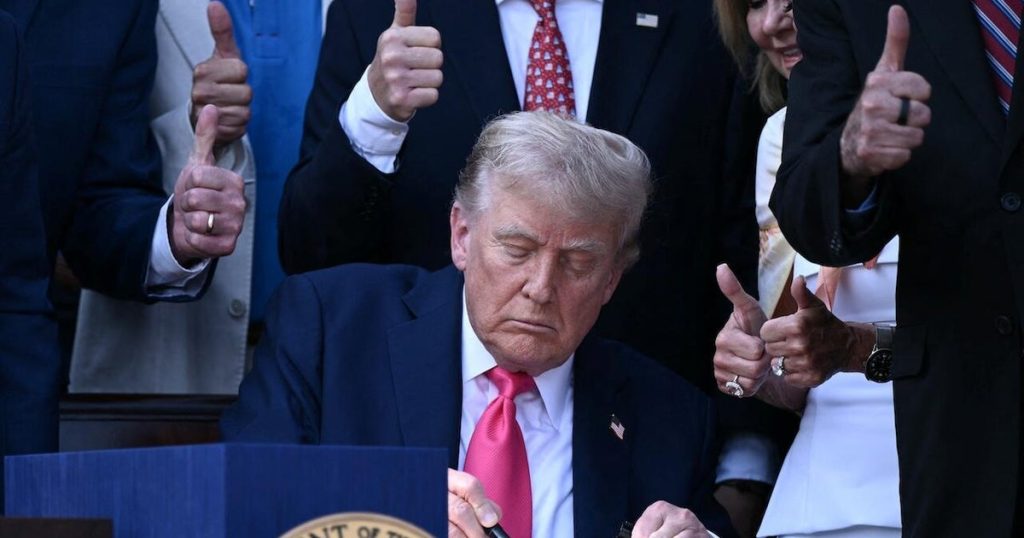A federal judge has temporarily halted the Trump administration’s efforts to revoke Medicaid funding for Planned Parenthood, issuing a restraining order just days after the controversial One Big Beautiful Bill Act was signed into law. U.S. District Judge Indira Talwani’s ruling, motivated by a lawsuit from Planned Parenthood, emphasizes the need to maintain funding for essential health services. This decision has significant implications for reproductive health services and access across the nation, impacting many patients who rely on Medicaid.
| Article Subheadings |
|---|
| 1) Overview of the Court’s Ruling |
| 2) Planned Parenthood’s Arguments |
| 3) Implications for Patients and Services |
| 4) Responses from the Trump Administration |
| 5) Broader Context of Abortion Funding Debates |
Overview of the Court’s Ruling
The temporary restraining order issued by Judge Indira Talwani serves as a significant moment in the ongoing legal battles over Medicaid funding related to abortion services. The ruling is set to last for 14 days and mandates that the Department of Health and Human Services (HHS) ensure the continued disbursement of Medicaid funds to Planned Parenthood. This decision comes in the wake of the One Big Beautiful Bill Act, which aimed to restrict federal funds to providers that offer family planning services and abortions. The legislation, while not explicitly naming Planned Parenthood, has been widely understood to target the organization and its affiliates directly.
Planned Parenthood’s Arguments
Planned Parenthood launched a lawsuit against the Trump administration to challenge the provision within the One Big Beautiful Bill Act. The organization argues that the provision represents a blatant attempt to penalize and undermine its services, potentially violating principles of fair treatment. In the litigation, Planned Parenthood highlights the fact that federal Medicaid dollars are already restricted from being used for abortion services except in specific circumstances such as rape, incest, or when the mother’s life is at risk. Planned Parenthood asserts that the latest move would disproportionately affect low-income patients who depend on Medicaid to access a range of essential health services.
Implications for Patients and Services
According to Planned Parenthood, the organization serves a significant number of patients who use Medicaid for various health services, including cancer screenings, sexually transmitted infection testing, and preventive care. The potential loss of federal funding due to the One Big Beautiful Bill Act could lead to “devastating effects” on the organization and the communities it serves. Planned Parenthood’s lawsuit further stresses that a loss of funding could force health centers to close, particularly those situated in rural or underserved areas, which would disproportionately affect women and marginalized communities. Absent alternatives, patients may face significant barriers to care.
Responses from the Trump Administration
In light of the ruling, a spokesperson from the White House stated the administration’s commitment to ending federal funding for what they termed “elective abortion services.” They echoed a sentiment that is often reported in the media, suggesting that public opinion favors restricting taxpayer funds from being allocated to organizations that provide or promote abortion. This stance is indicative of a broader narrative that resonates with a segment of the population opposed to abortion, who feel that federal funds should not contribute to such services.
Broader Context of Abortion Funding Debates
The current legal battle over Planned Parenthood’s funding is part of a larger conversation about reproductive rights and healthcare access in the United States. Recent Supreme Court rulings, including a decision allowing South Carolina to exclude Planned Parenthood from its Medicaid program, have highlighted the contentious nature of these issues. Advocacy groups, both for and against abortion rights, continue to clash in legislative arenas and courtrooms, illustrating the deeply divided opinions in American society. The outcome of these legal challenges could set precedents regarding the availability of reproductive health services funded by the federal government.
| No. | Key Points |
|---|---|
| 1 | A federal judge temporarily blocked the Trump administration from cutting Medicaid funding for Planned Parenthood. |
| 2 | The ruling is part of a lawsuit from Planned Parenthood challenging provisions in the One Big Beautiful Bill Act. |
| 3 | More than half of Planned Parenthood’s patients depend on Medicaid for services. |
| 4 | The Trump administration maintains that taxpayer dollars should not fund elective abortions. |
| 5 | The legal disputes highlight ongoing national debates about reproductive rights and healthcare access. |
Summary
The recent ruling to temporarily halt the revocation of Medicaid funding for Planned Parenthood underscores the contentious and ever-evolving landscape of reproductive healthcare in the United States. With critical implications for thousands of patients, particularly those in underprivileged communities, the legal outcome of Planned Parenthood’s lawsuit could significantly impact the organization and the health services it provides. As the debates over funding and healthcare access continue, the ruling may serve as a pivotal moment in the broader conversation surrounding reproductive rights.
Frequently Asked Questions
Question: Why did the judge issue a temporary restraining order?
The judge issued the temporary restraining order to ensure that Medicaid funding continues to flow to Planned Parenthood while the lawsuit is considered, highlighting concerns about the law’s impact on healthcare access.
Question: What are the potential consequences if funding is cut off?
If funding is cut off, more than half of Planned Parenthood’s patients who rely on Medicaid could lose access to crucial health services, leading to the potential closure of many health centers.
Question: How might this case influence future legislation?
The case could set important legal precedents regarding federal funding for reproductive health services, influencing how similar legislation is enacted and challenged in the future.


